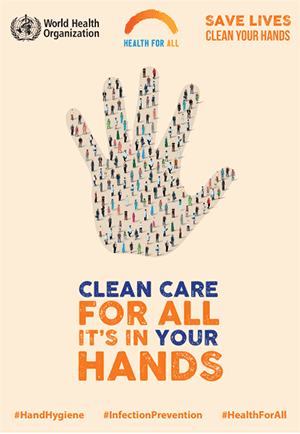 Global Hand Hygiene Day will be celebrated worldwide on 5 May 2019. This year, the focus will be the importance of good hand hygiene practices as part of improving patient safety globally to achieve universal health coverage (UHC), under the theme “Clean care for all – it’s in your hands”.
Global Hand Hygiene Day will be celebrated worldwide on 5 May 2019. This year, the focus will be the importance of good hand hygiene practices as part of improving patient safety globally to achieve universal health coverage (UHC), under the theme “Clean care for all – it’s in your hands”.
Hand hygiene is part of infection prevention and control (IPC) measures. Practising good hand hygiene is critical to achieving UHC as it is a practical and evidence-based approach with demonstrated impact on quality of care and patient safety across all levels of the health system.
Unfortunately, millions of patients worldwide suffer from health care-associated infections. These infections can worsen patients’ illnesses, prolong hospital stays, induce long-term disabilities and even cause death. They also drain resources and impose financial hardship on health care systems, as well as on patients’ families.
HAIs increase the risk of antimicrobial resistance (AMR) through the use of antibiotics for something that the patient wasn’t originally being treated for. They are also extremely costly. Between 50% and 70% of health care-associated infections are transmitted by hand and the growth of AMR could increase the severity of these further, as infections that we typically cure with antibiotics will become untreatable. For all these reasons, hand hygiene and infection prevention should be the first line of defence against AMR in hospitals, but it is often overlooked.
“Promoting hand hygiene and good IPC practices is vital to achieving UHC. On Global Hand Hygiene Day 2019, WHO calls on everyone to be inspired by the global movement to achieve UHC. Ensuring universal health coverage will result in better health and well-being for all people at all ages, including financial protection, access to quality essential health services and access to safe, effective, quality and affordable essential medicines and vaccines for all,” noted Dr Ahmed Al-Mandhari, WHO Regional Director for the Eastern Mediterranean.
Despite the critically important role of hand hygiene in reducing health care-associated infections and achieving UHC, overall compliance with hand hygiene is far from optimal in health care settings. An estimated 70% of health care workers do not routinely practise hand hygiene.
“Through this year’s campaign, we aim to bring all people together to support hand hygiene improvement locally and globally. I am glad to see that 2622 health care facilities in the 22 countries of the Eastern Mediterranean Region have registered for the campaign this year. This growing number reflects the tremendous efforts in the Region to promote safer care, thus achieving the targets in our vision for the Region, ‘Vision 2023: Health for All by All’. However, we need to see even greater engagement in future years to further advance quality and patient safety practices across the Region,” the Regional Director added.
Promoting hand hygiene requires coordinated efforts by many different health system stakeholders to eliminate the risk of acquiring health care-associated infections.
WHO calls on health workers, IPC leaders, health facility managers, ministers and policy-makers to play the key roles assigned to them. As part of the Hand Hygiene campaign, WHO is also promoting the concept “Champion clean care – it’s in your hands”.
WHO also urges ICP leaders and ministries of health to assess whether their country meets IPC standards, and to monitor and take action to achieve quality UHC.
More information on the global campaign


